The Neer-Tamba project invests in small businesses like indigenous poultry farming
29 May 2023
Project Name
Participatory Natural Resource Management and Rural Development Project (Neer-Tamba Project)
GEF Implementing Agency
IFAD
Objective
To promote and implement sustainably managed agro-ecosystems that are key to food security in the northern region of Burkina Faso.
Project Targets
land under integrated and sustainable management
GHG emissions avoided or reduced
Beneficiary households
In the northern region of Burkina Faso, 90% of the population are smallholder farmers with limited access to natural resources. Population growth has led to a growing demand for cultivable land and biomass, resulting in degradation of land, desertification, overcrowding, and diminishing wildlife and water resources. Deforestation is particularly critical in the northern region where desertification has severely impacted crop productivity and the availability of land for grazing. This shortage of arable land has led to conflicts over the use of natural resources.
Climate change is already impacting Burkina Faso through variation in rainfall, decreased rainfall, increased temperatures, and increased frequency and severity of climate events. These climate impacts lower agricultural productivity and further limit accessibility and availability of natural resources and ecosystem services.
To address these challenges, the Government of Burkina Faso, with IFAD support, launched the RFS Burkina Faso project, the Neer-Tamba project, to improve living conditions and incomes for rural households affected by poverty and food insecurity. This project is part of an approach based on building resilience. It draws on innovative activities to create and strengthen committees and associations at the sub-watershed level.
The project, which also extends to the country’s Eastern and North Central regions, aims to benefit 17,800 rural households through three principal components:
To ensure sustainability of the interventions, practices and arrangements recognised by stakeholders, particularly farmers, are already being scaled up.
The project aims to meet the following targets:
Capacity developed for national and regional multi-stakeholder platforms.
Integrated approaches for Sustainable Land Management (SLM) scaled up within agro-ecosystems.
Monitoring and Evaluation coordinated, including key indicators for decision-making on food security and environmental best practices.
The project falls under the financial oversight of the Ministry of Economy, Finance and Development, and the technical oversight of the Ministry of Agriculture and Water Development.
Other key stakeholders include the Executive Secretariat, National Council on Food Security; Permanent Secretariat for Coordination of Agriculture Sector Policies, Ministry of Livestock and Water Resources; Ministry of Environment; Green Economy and Climate Change Permanent Secretariat, National Council on the Environment and Sustainable Development; and National Bureau of Rural Chambers of Agriculture.
Each RFS country project conducts activities that fall under common thematic areas within the programme. Explore each project theme relevant to the RFS Burkina Faso country project below to see which activities are being implemented under each theme.
Stories from the Field
Explore our stories from the field to learn more about the activities, milestones, lessons learned, and achievements of the RFS Burkina Faso project.
Relevant Resources
We have a growing library of reports, briefs, case studies, media, tools and guidelines. Explore all resources related to the RFS Burkina Faso project to get greater insight into our programme activities.
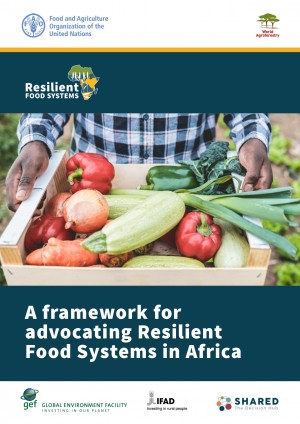
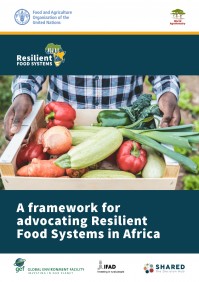
This framework aims to deepen the understanding of country teams to clarify their engagement in leveraging policy, institutional and behavioural change for achieving positive policy, institutional and human behavioural changes necessary to meet resilient food systems objectives. It provides an outline of the fundamental elements in the design and implementation of an advocacy strategy including understanding decision cycles and influence for sustainable land management and agroecological systems; shares experiences reflecting different scales of intervention (national, sub-national, local); and provides examples of how different mechanisms such as multi-stakeholder platforms can be used as an engine of socio-ecological change.
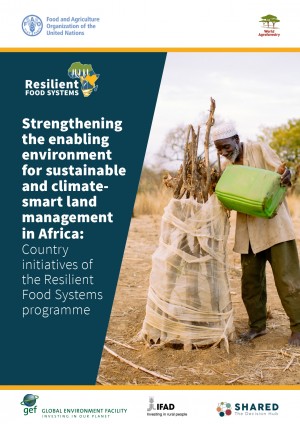
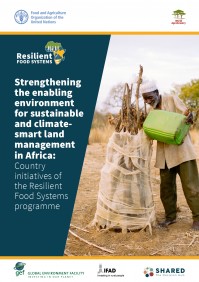
Barriers to implementation of sustainable land management (SLM) practices limit their ability to contribute to addressing land degradation. This report presents country case studies from the Resilient Food Systems programme highlighting SLM project activities undertaken in six countries in sub-Saharan Africa, and the lessons learned during their implementation. The innovative approaches to bridging governance and institutional gaps have demonstrated positive impacts on both the environment and livelihoods of rural communities.
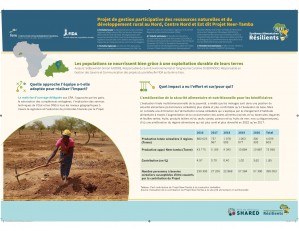
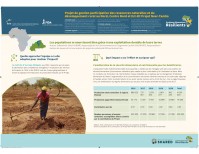
The 2022 Resilient Food Systems Knowledge Exchange and Learning Workshop included an interactive experience-sharing wall, featuring impact posters across RFS countries and components of the Regional Hub.
This poster was prepared by the Participatory Natural Resource Management and Rural Development Project (Neer-Tamba Project) in Burkina Faso.